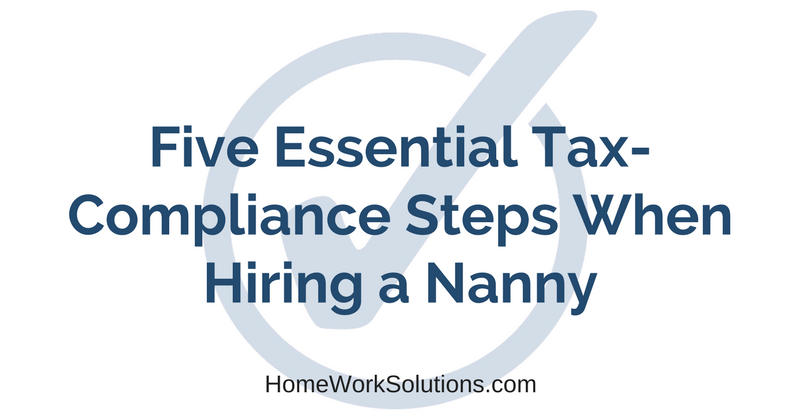
A nanny will become an essential member of your household, caring for the most precious part of your life. So it’s a sensible decision to onboard a nanny (or any household employee) the correct way. These four steps will ensure that your nanny can begin work without delay and, come tax season, you or your tax preparer will have the necessary elements to file correctly.
These steps will save you time and money, and ultimately, they provide peace of mind — which is one reason you hired a nanny, isn’t it?
Step 1: Set Expectations
Before you officially offer the position to someone, you need to define and determine appropriate taxes and payment. Do not assume that you can casually agree to pay a weekly amount of “net wages” and the rest is someone else’s responsibility. Compensation offers should be stated in terms of gross wages to avoid any miscommunication or discrepancies; use a payroll calculator like the one HomeWork Solutions offers to help determine effective rates of pay. Be aware of the taxes that must be paid, including payroll and Social Security taxes. You may wish to consult with a nanny tax expert about all of this.
And don't forget, experts agree that the most satisfying nanny:family relationships include a written work agreement that outlines benefits such as paid holidays, vacation and sick time, a confidentiality agreement, and a clear statement regarding hourly compensation and the taxes the employer will be withholding, if any.
Step 2: Register and Submit Forms
Now that you have determined the wage and what taxes you are responsible for, you need to check in with various levels of government. When you hire any household employee, you must immediately register with your state and the federal government as an employer. The former will provide you an employer registration number, and the latter provides a Federal Employer Identification Number, both of which will become necessary when filing quarterly payroll taxes and annual tax filings and information returns.
Your nanny must fill out the requisite W-4 and I-9 forms to determine withholding requirements and demonstrate the legal capacity to work in the U.S. Similarly, you must file a new hire report in your state to notify agencies of the hire.
Step 3: Don't Forget Insurance
Household employers are required to obtain a Workers' Compensation Insurance Policy at the time of hire in thirty-eight states. Even where it is not required, this is a BEST PRACTICE to protect both your family and the nanny in the unlikely event of a work related injury. HomeWork Solutions' clients can easily obtain this coverage through our Workers' Compensation Insurance Partner.
If the nanny will be driving your personal vehicle, we additionally recommend that you add her as a named driver to your auto policy. If the nanny will be driving your children in her personal vehicle, insure that she has adequate business use coverage on her auto policy and consider paying for it yourself.
Step 4: Track Hours and Pay
Congratulations! You followed the first three steps and now have on-boarded your nanny. You need to track your employee’s hours, gross and net pay, and withholdings beginning from the very first day of work. Maintaining accurate and contemporaneous records of your employee's hours worked is a legal obligation of all U.S. employers. You may consider using time card software or apps.
You should know your specific state minimum wage for household employment. While the federal minimum wage is $7.25 per hour, 38 states and the District of Columbia have higher minimum wage rates that supersede the federal wage. You may even be subject to a rate specific to the city or municipality in which you live, so be sure to do your research.
Many states also require that your employee receive a pay statement (pay stub) every pay day.
Step 5: Understand Overtime Rules
This final step is necessary for a comprehensive and clear picture on the relationship between your nanny and payment. Household employees are classified by federal law as non-exempt, which means that all nannies are hourly workers and cannot be paid a traditional salary. A nanny who works any overtime hours (above 40 in one week) and does not live with an employer is entitled to a minimum of 1.5 times the normal pay rate for those hours. Nannies who live in with an employer are not entitled to overtime at the federal level, but may be entitled at the state level. Note that you cannot skirt these restrictions by attempting to define your nanny as an independent contractor; the IRS keeps an eye out for this maneuver.
Tracking hours can be as simple as noting them on a calendar, but many smartphone applications are now available to keep track digitally. By clearly establishing the requirement for hourly pay and what qualifies as overtime, you can avoid disputes or confusion with your new nanny.
HomeWork Solutions specializes in nanny payroll and tax compliance. We can ensure that the proper pay and tax structures are in place when you hire your first nanny. Get in touch with us today by calling 1-800-626-4829 or contact us online.

